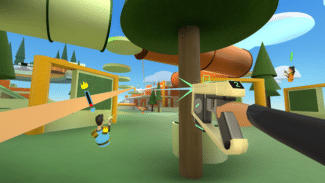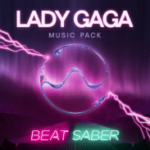When I first had Oculus Quest in my home in early 2019, I went into Rec Room for a game of paintball and found myself army crawling across my living room to get a better angle on the other team.
For me this is a visceral memory — an important moment in VR’s development when wireless freedom and a standalone all-in-one package actually delivered on the technology’s promise in a way it never had before. This week, on Quest 2, I visited a Horizon World that offered me a bit of déjà vu. Meta employees showed me some of the game mechanics builders can now use to build Worlds in Horizon — including a variety of “launchers” with different properties for each, which immediately brought to mind the gun varieties in Rec Room paintball. Then we played a game called Arena Clash with the launchers and it was fun. If I go back to that world now, my scores and progression will stay tied to it and associated with my Oculus ID.
In Arena Clash, Meta now has a destination on its servers that’s effectively a paintball world just like Rec Room’s. The biggest difference from Rec Room’s version being that Horizon Worlds uses details on your Facebook account to restrict entry to only account holders who are adults in the United States and Canada. Horizon Worlds seems set up to be pretty much Rec Room without all the children running around (and there’s no flat screen version yet). Over at Rec Room, they offer “Junior” accounts to players under 13 with no voice or text chat and unique usernames without personal information. Meta says it will phase out the requirement that Quest 2 headset owners have a Facebook account sometime next year, with the company also planning to offer a socially-enabled version of the starting experience called Horizon Home. Meta, of course, historically limits use of its headsets and social networking services to people aged 13 and up.
Powering everything in Horizon Worlds seems to be its own version of Rec Room’s “maker pen” — a robust set of tools that allow for building. In Horizon Worlds, you can build up from primitive shapes you resize as needed but can also benefit from the creations of others — pulling from their work to add to your own. Meta doesn’t offer a Horizon marketplace yet (Rec Room does offer a store for inventions), so there’s no place on Horizon where creators can sell their work. Instead, Meta is hosting competitions surrounding specific game mechanics and offering prizes to build with Horizon’s tools. Earlier this year, Rec Room said it expected to pay out more than $1 million to creators this year.
Compared to this platform when I first tried it in 2019, the destinations made with Horizon Worlds now seem to be approaching a level of polish and complexity that should be able to draw audiences in the same way Rec Room and VRChat have. And if you have a Quest or a Rift and you’re an adult living in the United States with a Facebook account, you can go check it out now.







